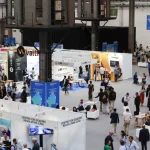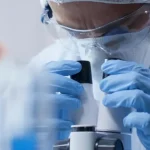BIOSPAIN 2025 kicks off in Barcelona: the leading national meeting point for biotechnology and one of Europe’s top references
The International Biotechnology Meeting BIOSPAIN 2025, held from October 7 to 9 at Fira de Barcelona – Montjuïc, and organized by the AseBio and Biocat, in collaboration with the Government of Catalonia and the Barcelona City Council, brings together biotechnology companies and institutions, regulatory agencies, and leading national and international investors. The aim is to reinforce the biotech industry’s role as a driving force behind the new healthcare model and as a key ally in building strategic autonomy for Spain and Europe in the fields of economy, health, sustainable food, and green industrial transition.
The fair was inaugurated today by Rocío Arroyo, President of AseBio; Juan Cruz Cigudosa, Secretary of State for Science, Innovation and Universities; Antoni Plasència i Taradach, Director General for Research and Innovation at the Department of Health of the Government of Catalonia; and Jordi Valls Riera, Deputy Mayor for Economy, Housing, Treasury and Tourism of the Barcelona City Council.
According to Rocío Arroyo, “BIOSPAIN 2025 marks a new era for the sector, consolidating itself as the main meeting point for Spanish biotechnology and one of Europe’s key reference events. We want this congress to serve as a bridge between international ecosystems while also acting as a local growth engine, showcasing the crucial role of biotechnology in strengthening Europe’s strategic autonomy in health, sustainability, and the economy. This year, we go one step further, with a program that combines innovation, investment, and forums such as the Green Innovation Forum and Talent Day, highlighting our industry’s immense potential to address major global challenges.”
Juan Cruz Cigudosa, Secretary of State for Science, Innovation and Universities, emphasized the strategic role of the biotechnology sector as a driver of economic and social development, and as an essential tool for addressing global challenges—from health and food to sustainability and energy transition. He underlined that Spain has a dynamic biotech ecosystem made up of innovative companies and world-class research centers. He reaffirmed the Spanish Government’s commitment to strengthening this ecosystem through an ambitious agenda supporting research, innovation, and knowledge transfer, with programs and instruments designed to sustain the sector’s growth and consolidate its role as a key pillar of a more competitive and sustainable production model.
BIOSPAIN 2025 connects investment, biotechnology, sustainable solutions, and talent
Over the three days of the event, BIOSPAIN aims to match or even surpass the record figures achieved in its last edition in 2023—also held in Barcelona—which brought together more than 2,200 participants from nearly 1,000 companies and organizations across 34 countries.
Under the theme “Global crossroads, local vibes,” the BIOSPAIN 2025 program will address the main challenges and opportunities in biotechnology in the fields of health, investment, and sustainability.
In healthcare, discussions will focus on Spain’s role in the development of Advanced Therapy Medicinal Products (ATMPs) and its contribution to European strategic autonomy, the potential of artificial intelligence and data in personalized medicine and oncology, and the early incorporation of health technology assessment (HTA) to accelerate patient access to innovation.
In the investment field, attention will turn to the role of domestic and international venture capital in boosting start-ups, the evolution of the Spanish investor profile—becoming increasingly specialized and strategic—and the opportunities offered by European and international capital markets to strengthen the biotech ecosystem.
In the green biotechnology space, topics will include the impact of alternative proteins and cultivated meat on the future of food, advances in sustainability and circular economy through projects that transform CO₂ into valuable products, and the role of synthetic biology as a driver of the new European bioeconomy.
This year’s edition includes a dedicated space, the Green Innovation Forum, for companies in the agricultural, food, and industrial biotechnology sectors (“green biotech”). The forum, last held in 2024 in Pamplona, is now integrated into BIOSPAIN to strengthen synergies and expand its international reach.
Additionally, on October 9, BIOSPAIN will host Talent Day, an event aimed at connecting young professionals, researchers, and companies to foster the talent driving the growth of Spain’s biotechnology ecosystem.
Catalonia: a key driver of innovation and economic development
The biotechnology sector is a fundamental pillar for building a more competitive, sustainable, and autonomous Europe. In Spain, scientific production in the biotechnology field represented 2.49% of global output in 2023, according to the AseBio 2024 report “Toward a More Competitive Europe.” In that same period, the biotech sector invested €1.282 billion in R&D—an increase of 5.2% over the previous year—placing Spain ninth worldwide in the number of biotechnology publications.
For Antoni Plasència, Director General for Research and Innovation at the Department of Health of the Government of Catalonia, “BIOSPAIN 2025 is an excellent opportunity to consolidate Catalonia’s leadership in biotechnology and life sciences by strengthening collaboration between institutions, companies, and research centers. Innovation and talent are essential pillars for advancing toward a more efficient and sustainable healthcare system—one that improves citizens’ quality of life and contributes to the country’s economic and social progress. Events like this accelerate the achievement of these goals.”
At the regional level, Catalonia’s life sciences and healthcare sector—the BioRegion of Catalonia—has established itself as one of the main drivers of innovation and economic and social development in Spain, positioning itself among Europe’s most competitive health innovation hubs. According to the BioRegion of Catalonia Report 2024, the sector reached a new record in investment in health startups and scaleups, raising nearly €350 million. Catalonia ranks fifth in Europe and eighth worldwide in the number of clinical trials involving Catalan centers.
In this regard, Jordi Valls Riera, Fourth Deputy Mayor for Economy, Treasury, Economic Promotion, and Tourism of the Barcelona City Council, stated: “Barcelona is a city of science and research, supported by a strong public healthcare system that guarantees this right, fostering innovation and attracting companies and investment—creating a virtuous cycle for the biomedical sector. This industry accounts for almost 8% of Catalonia’s GDP, and we are the leading Spanish region in health-related exports. Most of this activity is concentrated in Barcelona and its metropolitan area, home to 94% of Catalonia’s 1,400 health-sector companies. It is therefore an honor and a source of pride to host BIOSPAIN once again, reaffirming our position as one of Europe’s and the world’s main biomedical capitals.”
Finally, Robert Fabregat, Director General of Biocat, concluded: “Catalonia has an ecosystem of excellence, driven by a unique combination of cutting-edge science, entrepreneurial talent, and a growing network of investors and innovative companies. Our challenge is to transform this potential into real impact by connecting research with capital, markets, and society. BIOSPAIN is an excellent platform to strengthen these connections, generate new opportunities for international collaboration, and amplify the BioRegion of Catalonia’s position as a European benchmark in health innovation.”






